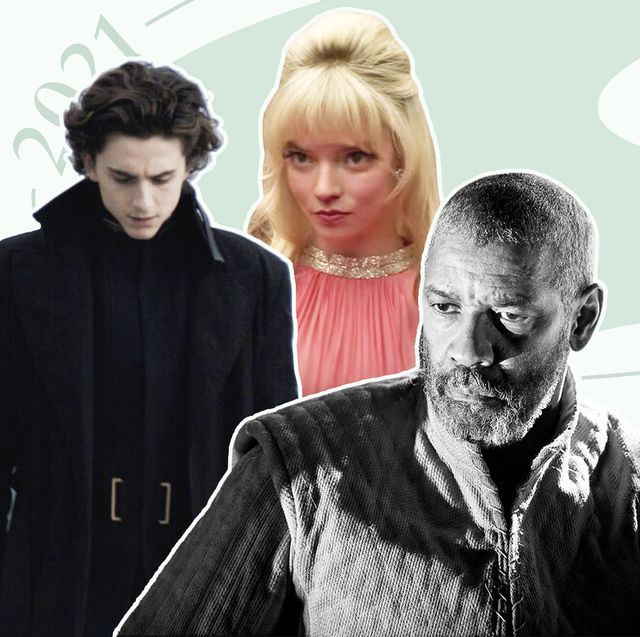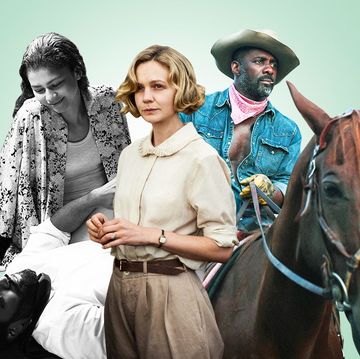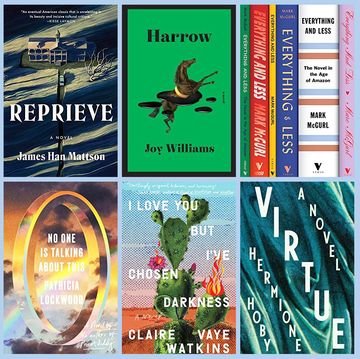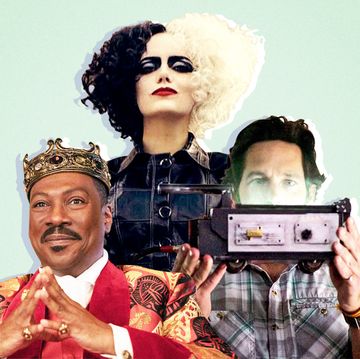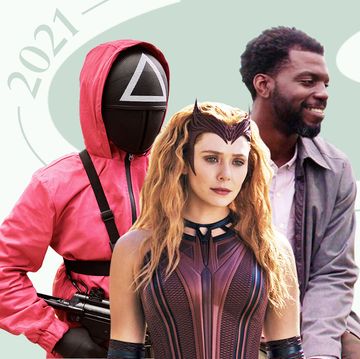The Best Movies of 2021
The year has provided some incredible films, many you can stream right now.
Every product was carefully curated by an Esquire editor. We may earn a commission from these links.
2021 is in the books, and despite the chaos, we’re still standing. So too is the movie industry, which has been on quite a rollercoaster ride courtesy of COVID-19 and our up-and-down efforts to contain it. Between the theatrical business’ state of flux, and the bumpy track record of movies that opted to debut day-and-date at the multiplex and at home–not to mention the sheer confusion caused by all these shifting paradigms–it’s a minor miracle that, as we get set to turn the calendar to 2022, the country’s cinematic state of affairs is as stable as it presently is.
Credit for that resilience goes in large part to the insatiable appetite of American cinephiles, as well as the abundance of terrific features that, over the past twelve months, have graced screens both big and small. No matter where they premiered (or were seen), offerings from illustrious auteurs and promising newcomers were everywhere, led by the latest from Joel Coen, Joachim Trier, Roy Andersson, Paul Thomas Anderson and Ryusuke Hamaguchi, whose dramas comprise our top five. Rather than restrict ourselves to a select few triumphs, however, we here at Esquire continue to believe that more is always merrier, and that especially this year, it’s only right to celebrate the numerous diverse domestic and international works that chilled, thrilled, amused, excited and inspired us.
While no list can be definitive, and no unanimous consensus can be achieved, we’re confident you won’t find a more eclectic and electric group of gems than those we’ve chosen as the Best Movies of 2021.
65) Honeydew
Don’t eat anything of unknown origins–a warning that goes unheeded by oft-bickering Riley (Malin Barr) and Sam (Sawyer Spielberg, son of Steven) in Honeydew. On a New England camping trip, the couple have a run-in with an unfriendly landowner who evicts them from their sleeping spot, forcing them to embark on a nocturnal trek through the woods that leads to the home of Karen (Barbara Kingsley). Though Riley and Sam are vegans, they’re compelled to chow down on some of Karen’s home-cooked beef and bread, the latter of which is especially dicey given that this region is notorious for having lost crops and cattle to a poisonous spore. That’s just the beginning of the ordeal writer/director Devereux Milburn has in store for his protagonists, who are joined at their dinner by a dazed-looking man with a bandaged head, and who soon discover that Karen has devious plans for them–some of it having to do with her daughter. Crafted with jarring edits and split screens for maximum disorientation, the ensuing mayhem is stunning, scary and considerably gross, heralding the arrival of a uniquely out-there horror voice.
64) Can You Bring It: Bill T. Jones and D-Man in the Waters
Timeless art is often born out of highly particular experiences. At least, that was the case with dancer and choreographer Bill T. Jones’ D-Man in the Waters, a famed 1989 piece that was inspired by the fatal battles of both his partner Arnie Zane and company star Demian “D-Man” Acquavella with AIDS. Director Tom Hurwitz and Rosalynde LeBlanc’s documentary Can You Bring It: Bill T. Jones and D-Man in the Waters is both a historic tribute to that work and an examination of its continuing relevance, which comes to the fore via former Jones collaborator LeBlanc’s staging of the number with a group of students at California’s Loyola Marymount University. The young performers’ attempts to make their adaptation of D-Man in the Waters speak to today is a pressing concern during rehearsals, and also factors into Jones’ visit to LeBlanc’s studio, where he provides casting pointers and background on the origins of the show, which Jones and original troupe members discuss with insightful poignancy. Decades after their original losses, their pain doesn’t appear to have dimmed, and Hurwitz and LeBlanc’s documentary illustrates how grief, survival and swimming-against-the-current resolve can be core catalysts for lasting creativity.
63) Cliff Walkers
Zhang Yimou (Hero, House of Flying Daggers) brings glamorous style to familiar spy-movie clichés in Cliff Walkers, a knotty 1930s-set espionage saga in which four Chinese communist agents sneak into Japan-occupied Manchuria to smuggle out the sole survivor of a torture camp. This quartet splits up into couples to achieve their covert aim, only to be immediately and constantly beset by encounters with comrades who may be double (or triple?) agents. Be it early shots from the perspective of its parachuting-through-trees protagonists, or a snowy attempt to infiltrate a metropolitan gala, Zhang blends Hitchcockian suspense with Dr. Zhivago beauty, all while shouting out to (among others) Charlie Chaplin and Sergio Leone. Virtually every convention in the Spy Fiction 101 book makes an appearance at some point, but the thrill is in the director’s orchestration of numerous set pieces that are all the more suspenseful for being somewhat inscrutable–a situation caused by plotting that keeps identities and relationships fuzzy and in flux. It may be dedicated to the Communist Revolution, but its real heart belongs to classic Hollywood.
62) The Vigil
Things go horribly wrong in The Vigil for Yakov (Dave Davis), a young man who–having left his ultra-orthodox Jewish community for a secular Brooklyn life–accepts a job sitting vigil for a recently deceased Holocaust survivor. That task not only returns him to the neighborhood (and faith) he rejected, but puts him in the crosshairs of an evil demonic force that, it turns out, plagued the dead man over whom he watches, and his wife (Lynn Cohen), who behaves creepily around David in her darkly lit Borough Park home. Keith Thomas’s feature debut has a great sense of its insular milieu as well as the trauma and stress of escaping an extremist religious environment, and the writer/director drums up suspense from set pieces that exploit silence to eerie effect. Davis’s harried countenance is the glue holding this assured thriller together, lending it an empathetic anguish that helps cast its action as a story about confronting the (personal and historical) past as a means of transcending, and escaping, it.
61) Cry Macho
Clint Eastwood’s movies are almost always best when they star their director. Back in the literal saddle for the first time in decades, the Hollywood legend’s latest finds him playing a broken-down ex-rodeo star named Milo who, to repay a debt to his former boss (Dwight Yoakam), travels to Mexico to retrieve the young man’s son Rafo (Eduardo Minett). The two embark on an odyssey back to the States with his fighting rooster Macho in tow. Eastwood underlines Milo’s virility at every turn–he punches out a bad guy, holds an adversary at gunpoint, tames wild steeds, and proves irresistible to the ladies–but simultaneously has him comment on the emptiness of violent machismo, which has left him with nothing but loneliness, heartache and regret. An adaptation of N. Richard Nash’s novel that moves at the same pace as its 91-year-old headliner, the film moseys along from one minor incident to another, playing a familiar Western tune with sweet sensitivity. Eastwood may be physically past his prime, but he’s still got plenty of grit and grace.
60) I Carry You With Me
Documentarian Heidi Ewing’s first narrative feature recounts the true-life story of Ivan and Gerardo, a gay Mexican couple who fled their fraught home lives for a new start in America. Dislocation is central to their tale, with Ivan in particular caught between love for his partner and for his son and family, whom he chooses to leave behind in search of freedom, tolerance and a potential career as a chef. I Carry You With Me exudes empathy for these individuals’ plights, which includes suffering sidewalk beatings from random homophobes and the slings and arrows of their disapproving clans. Ewing shoots their travails in warm hues and with handheld camerawork that often spies them through barriers, suggesting their imprisoned condition. Those circumstances don’t completely change once they reach the United States, as conveyed by late non-fiction passages that address the real Ivan and Gerardo’s present-day trapped-between-two-worlds situation. There are no easy answers proffered by this tender and compassionate film, just an irreconcilable combination of happiness, relief, and frustrated longing for an unachievable happy ending.
59) Plan B
Natalie Morales’ Plan B is a refreshingly candid and open-minded celebration of pro-choice teen sex and friendship, but the real draw of this abortion-themed comedy is its potent humor. Convinced to throw a house party by her best friend Lupe (Victoria Moroles), Sunny (Kuhoo Verma) has sex not with her crush Hunter (Provost) but with religious nerd Kyle (Mason Cook)–a decision that leads to crisis when, the next morning, she comes to fear that she’s pregnant. Thus a rollicking mission to obtain a morning-after Plan B pill is born, driven by Sunny’s fear of not only teen parenthood but disappointing her demanding Indian mother (Jolly Abraham). Punctuated by a bevy of hilarious one-liners, Prathi Srinivasan and Joshua Levy’s script is raunchy and sweet in equal measure, capturing its protagonists’ anxieties and desires (for sex, for acceptance) with absurd heart. As the hesitant-to-come-out Lupe, Moroles is a consistent delight, and Verma is even better as the frazzled Sunny, in what may be the breakout performance of the year.
58) The Mitchells vs. The Machines
With The Lego Movie and Spider-Man: Into the Spider-Verse, Phil Lord and Christopher Miller set new standards for visually and narratively inventive animated features, and they continue that hot streak with The Mitchells vs. the Machines, a wild tale of warfare between a family and a legion of robots controlled by an angry outdated AI (Olivia Coleman). This unlikely battle breaks out during the Mitchells’ cross-country trip to deliver wannabe-auteur Katie (Abbi Jacobson) to college, which itself is instigated by dad Rick (Danny McBride), who’s desperate to reconnect with his from-different-worlds girl. Father-daughter rifts are at the heart of writers/directors Michael Rianda and Jeff Rowe’s adventure, which blends CGI, hand-drawn and live-action material to create a zany rainbow-hued aesthetic that’s constantly surprising and inherently attuned to 21st-century online reality, where cartoons, memes and DIY styles reign supreme. Aided by an expert voice cast and a script that piles on gags and one-liners with verve–highlighted by a showdown with a legion of evil Furbys–it’s a manic ode to accepting and embracing the future while retaining bonds with the past.
57) Summer of Soul (...Or, When the Revolution Could Not Be Televised)
In Summer of Soul (...Or, When the Revolution Could Not Be Televised), Ahmir “Questlove” Thompson doesn’t just restore never-before-seen footage of the 1969 Harlem Cultural Festival; he expertly cuts it together to create a lively and passionate tapestry of Black America at a turning point. Resurrecting the memory of this forgotten concert–which took place on the day of the Moon landing, and in the same season as Woodstock–Thompson finds a Black and Latino Harlem in the throes of change, driven by a variety of factors that the director seamlessly integrates into his copious performance clips featuring the likes of Stevie Wonder, BB King, Gladys Knight & the Pips, Nina Simone, The Fifth Dimension and Mahalia Jackson. The canny, rhythmic structure of the film, which also includes commentary from those who played and attended the event, is key to its pointed power. Ultimately, though, it’s the music that lifts up these proceedings, which peak whenever Sly & the Family Stone take the stage.
56) Nobody
Bob Odenkirk takes one hell of a beating in Nobody–and, per a joke made by his Hutch Mansell, you should see the other guys. Director Ilya Naishuller’s film is an obvious riff on John Wick, concerned as it is with a nondescript and seemingly meek family man who, following a home invasion, taps back into his government-assassin true nature and goes on a rampage that eventually inflames the ire of a Russian gangster (Aleksei Serebryakov). Yet a lack of novelty is hardly necessary in light of Odenkirk’s masterful performance as a man brought low by self-deception and, consequently, resurrected by facing his inherent angry identity. Odenkirk’s ability to handle the barrage of brutal set pieces thrown his way is itself part of this affair’s conceit, and yet once he proves his action-movie mettle, the proceedings lose none of their verve, delivering gory mayhem with a tongue planted firmly in cheek. The late participation of Christopher Lloyd and RZA only boosts the goofy charm of this R-rated romp, which goes for broke–and breaks a lot of bones in the process–to amusingly ferocious ends.
55) Land
Loss leads to retreat for Edee (Robin Wright), a woman who responds to an unspecified tragedy by moving to a remote Wyoming cabin in Land. Willfully cut off from civilization, Edee finds her new survivalist existence more than a bit difficult, what with the bitter cold, the sparse food (courtesy of fishing), and the occasional outhouse run-in with a bear. In her directorial debut, Wright employs compositions that call understated attention to the alienated anguish of her protagonist, whom she embodies as a fragmented (and potentially suicidal) woman with a sorrow as deep and cold as the vast wilderness. A spark comes at her moment of wintery death courtesy of Miguel (Demián Bichir), a rancher who revives her first literally, and then figuratively, teaching her to hunt (as her personal Yoda) and reminding her of the vital human connection that gives everything purpose. Guided by Wright’s expressively interior performance and Jesse Chatham and Erin Dignam’s spartan script, the film captures the universal desire for escape in the face of grief, and the way resurrection often comes from accepting death as an inescapable facet of life.
54) Last Night in Soho
The seductive past is not to be trusted in Last Night in Soho, Edgar Wright’s musical-period piece-thriller about an aspiring fashion designer (and medium) named Eloise (Thomasin McKenzie) whose infatuation with 1960s London leads her down a dark rabbit hole when, upon relocating from the countryside to the city for school, she begins experiencing visions of a wannabe-singer beauty (Anya Taylor-Joy) and her charming manager (Matt Smith). Mirrors, staircases, pulsating colored lights and descents into literal and figurative infernos are all part of Wright’s stylish film, which eventually takes a sharp turn from Repulsion-style psychological freak-out to supernatural fright-fest. The director swings big with every bold aesthetic gesture, aiming to deliver scares and sexiness alongside pointed commentary about inherited female sexual trauma. Its soundtrack awash in era-specific deep cuts, Last Night in Soho is a cautionary tale about the dangerous allure of nostalgia that nonetheless radiates affection for ‘60s Soho’s electric energy. Reveling in its own deliriousness, it’s a mash-up spearheaded by an enchanting Taylor-Joy as a specter whose dashed dreams are the stuff of nightmares.
53) The Night House
The Night House boasts the year’s best jump-scare. Better still, it features one of 2021’s finest performances courtesy of Rebecca Hall as a woman whose anguish over her husband’s recent suicide is complicated by unnerving discoveries about the secret life he’d led. Director David Bruckner’s follow-up to The Ritual concerns Beth (Hall), a teacher whose attempts to cope with sudden widowhood are interrupted by strange noises, visions, and clues that suggest her spouse Owen (Evan Jonigkeit) was up to something strange in and around their lakeside home in woodsy upstate New York. The revelations that follow are of a semi-oblique sort, the better to cast an eerie pall that never tips over into exposition-heavy leadenness. Grief and guilt are an identical monster in this disquieting thriller, which gets suspenseful mileage out of shrewd perspective-manipulating imagery and skillful pacing. Most of all, though, it benefits from Hall, whose superb turn as the devastated Beth is equal parts solemn and seething, vulnerable and fierce, unstable and assured.
52) Swimming Out Till the Sea Turns Blue
Jia Zhangke investigates the ongoing transformation of China–and the inextricable relationship between the past and the present, the urban and rural–through the prism of three famed authors in Swimming Out Till the Sea Turns Blue. Guided by interviews with writers Jia Pingwa, Yu Hua, and Liang Hong, each of whom grew up in the same Shanxi province as Jia (albeit in different decades), the director examines the way in which their own travails before, during and after Mao’s Cultural Revolution helped inform their feelings about their fractured families, their remote countryside hometowns, and themselves–pressing and complicated issues they address through their artwork. That they recount their own biographical narratives here only further underlines Jia’s focus on the act of storytelling as a means of understanding, processing, expressing and passing down unique and universal human experiences. Split into chapters and shot with a lyrical focus on contemplative faces and serene, changing landscapes, Jia’s snaking, inquisitive non-fiction work proves a subtle rumination on shifting individual and national Chinese identity.
51) The Power of the Dog
Role-playing is rampant in The Power of the Dog, a Western in which burdens of expectation are almost as deadly as the true selves lurking within. Director Jane Campion’s first feature in a decade is a haunting adaptation of Thomas Savage’s novel about 1925 Montana chaos created by warring visions of masculinity, with demanding and intelligent roughneck cowboy Phil (Benedict Cumberbatch) at odds with his more refined brother George (Jesse Plemons) as well as George’s new bride Rose (Kirsten Dunst) and her effeminate son Peter (Kodi Smit-McPhee). Phil’s fury and cruelty are born from an easily identifiable secret, yet Campion’s film is less about that single mystery than the various ways these figures are governed, hemmed in, and crushed by the demand that they conform to the Old West’s macho and domestic codes of conduct. The relationship between the internal and the external is neither easily struck nor easily understood—a that notion is captivatingly embodied by Cumberbatch as a frontiersman who believes that manly strength is acquired through nastiness and filth, and who pays a terrible price for that misconception.
50) The Lost Daughter
Maggie Gyllenhaal has become a canny chronicler of parental dissatisfaction, and following formidable turns in Sherrybaby, The Kindergarten Teacher and HBO’s The Deuce, she again tackles that topic with her directorial debut The Lost Daughter, an adaptation of Elene Ferrante’s novel of the same name. On a summer vacation on a Greek island, Leda (Olivia Coleman) sits alone on the beach, flirts with a handyman (Ed Harris), and unexpectedly involves herself with a gangster-ish clan after she helps recover the missing daughter of Nina (Dakota Johnson). As divulged by flashbacks to Leda’s younger motherhood (with Jessie Buckley as the twenty-something Coleman), Leda and Nina share similar maternal hang-ups, and the dynamic that develops between the two eventually turns dangerous and traumatic for everyone. At once aloof and imposing, tremulous and blunt, Coleman embodies Leta as a complex mom whose affection for others is dwarfed by her irrepressible love for herself, and Johnson matches her toe-for-toe as the confused and conflicted Nina. Gyllenhaal’s immediate, spiky direction breathes volatile life into this unpredictable drama of clashing instincts.
49) The Killing of Two Lovers
The sound of chopping wood and cocking pistol hammers are incessant in The Killing of Two Lovers–jarring and ominous sonic punctuations that do much to fortify the roiling suspense of writer/director/editor Robert Machoian’s tormented domestic drama. In a barren Utah town where the sky seems to weigh down upon its inhabitants, David (Clayne Crawford) strives to deal with an unwanted separation from his wife Nikki (Sepideh Moafi), who lives in their old home with their four kids, and is sharing a bed with Derek (Chris Coy), much to David’s chagrin. Opening with the sight of David pointing a gun at his wife and her lover in bed, the film proceeds to detail its protagonist’s efforts to mend his marriage while coping with the barely suppressed killing rage ignited by his circumstances. The struggle to keep inner turmoil from begetting external bloodshed is brought to tumultuous life by Crawford, who embodies David empathetically with a hurt, rage, and desperation that’s mesmerizing, as well as by Machoian’s direction, full of long takes and hardscrabble compositions that place an emphasis on anguished faces and interpersonal dynamics.
48) The Last Duel
Ridley Scott’s finest 2021 feature, The Last Duel fashions a real-life tale into a Rashomon-style drama that, it turns out, is less concerned with the unknowability of truth than with history’s habitual negation of female perspectives. Based on Eric Jager’s book, Scott’s 14th-century French story is about the alleged rape of Marguerite de Carrouges (Jodie Comer) by Jacques Le Gris (Adam Driver), and the efforts of Marguerite’s husband Sir Jean de Carrouges (Matt Damon) to bring Jacques to justice for his crime. As written by Nicole Holofcener, Damon and Ben Affleck (who also co-stars, excellently, as the imperiously arrogant Count Pierre d’Alençon), the film is trifurcated to present first Jacques and Jean’s skewed, self-serving versions of events, and then Marguerite’s more genuine POV, which throws the men’s (and era’s) misogynistic attitudes into sharp relief. Scott also makes sure to deliver the warfare goods, both in early battles that demonstrate Jean’s fighting prowess, and in a climactic showdown whose viciousness speaks to the ugly machismo at the heart of this tale.
47) Ema
The giant glowing sun-like orb on stage behind dancer Ema (Mariana Di Girolamo) at the start of Ema could be a symbol of creation or destruction, both of which are pressing undercurrents throughout Pablo Larraín’s scorching drama, which tracks the young title character as she copes with the fallout from her and husband/dance troupe director Gastón’s (Gael Garcia Bernal) decision to give back their adopted son Polo (Cristian Felipe Suare) after the boy nearly incinerated Ema’s sister in a fit of pyromania. Fiery tensions are everywhere in this hypnotic film–be it between love and sex, passion and reason, sanity and madness, or modern art and reggaeton street culture–as Ema reacts to her situation by concocting a scheme to get her child back through carnally devious means. Larraín stages his material like a sweaty, pulsating fever dream-cum-dance-routine, all of it revolving around his alternately entrancing and horrifying protagonist, whose quest for motherhood takes on increasingly demented form. There’s palpable volatility to his study of Di Girolamo’s intriguing Ema, who proves to be a figurative and literal flamethrower.
46) The Sparks Brothers
Not only do you not need to be a fan of Sparks–the L.A.-via-London band led by siblings Russell and Ron Mael–to enjoy The Sparks Brothers; you don’t even have to know who they are. Edgar Wright’s enthusiastic non-fiction portrait of the group provides a chronological rundown of their unkillable career, which has continued to thrive despite failing to achieve the household-name status that often seemed to be its destiny. Exuberant singer Russell and Hitler-mustached Ron are front-and-center in Wright’s film, providing droll commentary (alongside scores of collaborators and admirers) about their eccentric path, which has included ahead-of-their-time pitstops in pop, electronica, punk and alternative rock (not to mention an abiding love of cinema). Cleverly edited archival-footage montages and diverse animated sequences are instinctively attuned to Sparks’ all-over-the-place wavelength, expressing the joyous anything-goes attitude that has long guided their music. Sparks’ madcap trajectory resembles that of a rollercoaster (apt, given their participation in 1977’s Rollercoaster), and Wright’s film is a celebration of the enduring vitality of their unique art.
Watch Next


Every Star Wars Show Coming to Disney+

The Best Memes of 2021

The Best Video Games of 2021

The Best Songs of 2021
